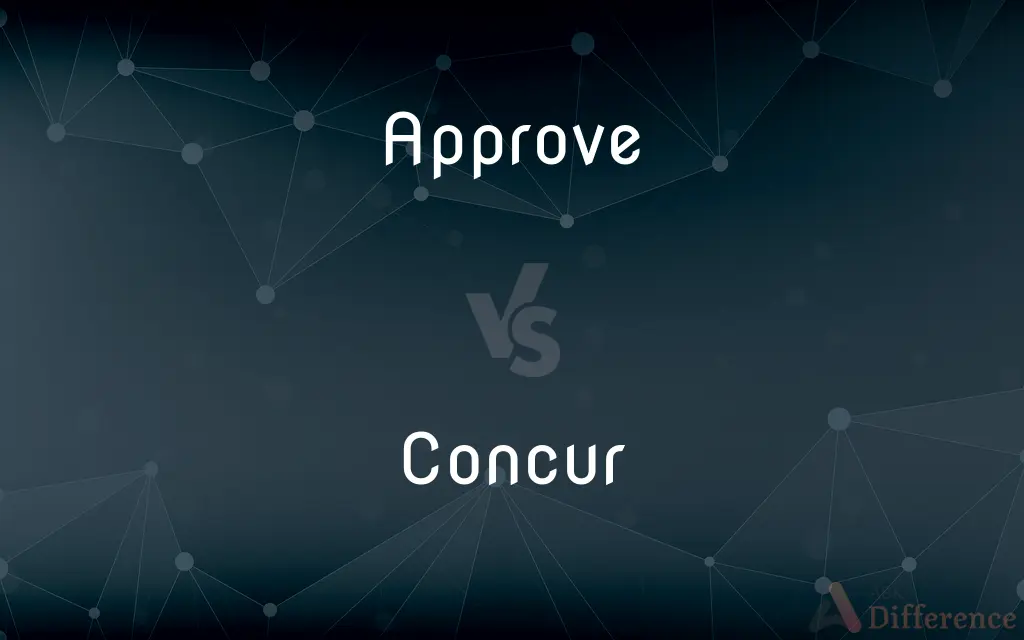Approve vs. Concur — What's the Difference?
Edited by Tayyaba Rehman — By Fiza Rafique — Updated on April 25, 2024
"Approve" means to formally agree to or endorse something, typically following evaluation; "concur" means to agree or have the same opinion, especially in a discussion or decision-making process.

Difference Between Approve and Concur
Table of Contents
ADVERTISEMENT
Key Differences
Approving involves a formal or official agreement, often used in contexts where authorization or permission is granted. Whereas concurring is about agreeing with an opinion, idea, or decision, emphasizing a shared perspective.
Approval can be seen in various settings such as business, where managers approve projects, budgets, or policies. On the other hand, concurring is often used in more collaborative contexts, such as meetings or panels, where members may concur with a leader’s or another member’s viewpoint.
Approval usually requires some level of authority; for example, a supervisor approves an employee's leave request. Conversely, concurring does not imply authority but rather agreement among equals, like colleagues concurring on a solution to a problem.
The process of approval often involves evaluation or review, ensuring that the subject meets specific criteria or standards before it is sanctioned. In contrast, concurring is typically a part of discussions or debates and is more about personal or collective agreement without the necessity of a formal evaluation.
While both terms deal with agreement, approval is more about consent and acceptance from a position of power, and concurring is about mutual agreement in opinions or decisions among participants or stakeholders.
ADVERTISEMENT
Comparison Chart
Definition
To formally accept or sanction
To agree or have the same opinion
Authority
Implies authority to grant permission
Implies equality in agreement
Usage Context
Business, legal, administrative
Meetings, discussions
Requirement
Evaluation or review
Mutual understanding or perspective
Example
"The board approved the new policy."
"I concur with your analysis of the situation."
Compare with Definitions
Approve
To think well of someone or something; to favor an idea.
She approved of their plan to redesign the website.
Concur
To coincide; to occur at the same time.
The events concurred, creating an unexpected synergy.
Approve
To officially accept or agree to something after considering it.
The manager approved the budget for the next quarter.
Concur
To cooperate; to work together.
The departments need to concur to streamline the process.
Approve
To permit or authorize by law or policy.
Only the director can approve these expense reports.
Concur
To agree in one common result; to come together.
The evidence presented made all parties concur on the verdict.
Approve
To sanction or endorse officially.
The committee needs to approve the final draft before it is published.
Concur
To accord in opinion; agree.
The partners concurred on the terms of the agreement.
Approve
To confirm or ratify something.
The senate approved the treaty after a long debate.
Concur
To agree with someone; to have the same opinion.
He concurred with the committee’s decision without hesitation.
Approve
To consent to officially or formally; confirm or sanction
The Senate approved the treaty.
Concur
To be of the same opinion; agree
Concurred on the issue of preventing crime.
Approve
To consider right or good
"He came to ask me ... whether I approved his choice altogether" (Jane Austen).
Concur
To combine in bringing something about; act together
Factors that concurred to prevent a meeting of the leaders.
Approve
(Obsolete)To prove or attest.
Concur
To occur at the same time; coincide
Icy sleet that concurred with a forceful wind.
Approve
To show, feel, or express approval
We didn't approve of the decision.
Concur
(Obsolete) To converge; meet.
Approve
(transitive) To officially sanction; to ratify; to confirm; to set as satisfactory.
Although we may disagree with it, we must nevertheless approve the sentence handed down by the court-martial.
Concur
To grant or concede
"French surgeons ... could only concur that it was a mortal wound" (Susan Dunn).
Approve
(transitive) To regard as good; to commend; to be pleased with; to think well of.
We approve the measure of the administration, for it is an excellent decision.
Concur
To agree (in action or opinion); to have a common opinion; to coincide; to correspond.
Approve
To make proof of; to demonstrate; to prove or show practically.
Concur
To meet in the same point; to combine or conjoin; to contribute or help towards a common object or effect.
Concurring plans
Concurring lines of thought
Approve
To consider worthy (to); to be pleased (with); to accept.
Her mother never approves of any of her boyfriends. She thinks nobody is good enough for her little girl.
Concur
(obsolete) To run together; to meet.
Approve
To show to be worthy; to demonstrate the merits of.
Concur
(rare) To converge.
Approve
To make profit of; to convert to one's own profit — said especially of waste or common land appropriated by the lord of the manor.
Concur
To run together; to meet.
Anon they fierce encountering both concurredWith grisly looks and faces like their fates.
Approve
To show to be real or true; to prove.
Wouldst thou approve thy constancy? ApproveFirst thy obedience.
Concur
To meet in the same point; to combine or conjoin; to contribute or help toward a common object or effect.
When outward causes concur.
Approve
To make proof of; to demonstrate; to prove or show practically.
Opportunities to approve . . . worth.
He had approved himself a great warrior.
'T is an old lesson; Time approves it true.
His account . . . approves him a man of thought.
Concur
To unite or agree (in action or opinion); to join; to act jointly; to agree; to coincide; to correspond.
Mr. Burke concurred with Lord Chatham in opinion.
Tories and Whigs had concurred in paying honor to Walker.
This concurs directly with the letter.
Approve
To sanction officially; to ratify; to confirm; as, to approve the decision of a court-martial.
Concur
To assent; to consent.
Approve
To regard as good; to commend; to be pleased with; to think well of; as, we approve the measured of the administration.
Concur
Be in accord; be in agreement;
We agreed on the terms of the settlement
I can't agree with you!
I hold with those who say life is sacred
Both philosophers concord on this point
Approve
To make or show to be worthy of approbation or acceptance.
The first care and concern must be to approve himself to God.
They had not approved of the deposition of James.
They approved of the political institutions.
Concur
Happen simultaneously;
The two events coincided
Approve
To make profit of; to convert to one's own profit; - said esp. of waste or common land appropriated by the lord of the manor.
Approve
Give sanction to;
I approve of his educational policies
Approve
Judge to be right or commendable; think well of
Common Curiosities
What is an example of concurring in a legal context?
In a legal context, a judge might concur with another judge’s opinion, thereby supporting the reasoning and conclusions in a case.
Can someone approve and concur at the same time?
Yes, someone can approve a decision formally and also personally concur with the opinions that led to the decision.
How important is concurring in teamwork?
Concurring is essential in teamwork as it fosters unity and shared commitment towards common goals.
What types of documents need approval?
Documents such as policies, project proposals, budgets, and official communications often require approval from someone in a position of authority.
What does it mean to approve something?
To approve something means to formally agree to it or sanction it, typically after some evaluation.
How do you express concurring in a meeting?
You can express concurring in a meeting by explicitly stating agreement with a point made by another participant or by endorsing a collective decision.
How does concurring differ from agreeing?
Concurring specifically implies a mutual agreement in opinion, often in a formal discussion or decision-making context.
Is approval necessary in all business decisions?
Not all decisions require formal approval, but key decisions typically do, particularly in larger organizations.
Can a project proceed without approval?
Typically, projects require approval from relevant authorities within an organization to proceed, especially if they involve significant resources or changes.
How can one effectively concur in a professional setting?
Effectively concurring in a professional setting involves clearly stating agreement with decisions or opinions, providing supportive reasoning, and maintaining a collaborative attitude.
Can a manager both approve and not concur?
Yes, a manager might approve a decision due to its alignment with policy or majority opinion, while personally not concurring with the decision.
What’s the main difference between approve and concur in terms of power dynamics?
Approval often comes from a higher authority and carries official weight, whereas concurring involves agreement among equals and doesn’t imply hierarchy.
Is it possible to concur by silence?
In some contexts, silence can imply concurrence, especially if prior agreement is expected or customary.
Do you need authority to concur?
No, concurring does not require authority but rather a shared perspective or agreement with others.
Does approval imply that the approver agrees with the content?
Approval implies agreement with the action being taken rather than personal agreement with every detail; it's more about endorsing the decision from an official capacity.
Share Your Discovery

Previous Comparison
Posit vs. Postulate
Next Comparison
Hitherto vs. ThithertoAuthor Spotlight
Written by
Fiza RafiqueFiza Rafique is a skilled content writer at AskDifference.com, where she meticulously refines and enhances written pieces. Drawing from her vast editorial expertise, Fiza ensures clarity, accuracy, and precision in every article. Passionate about language, she continually seeks to elevate the quality of content for readers worldwide.
Edited by
Tayyaba RehmanTayyaba Rehman is a distinguished writer, currently serving as a primary contributor to askdifference.com. As a researcher in semantics and etymology, Tayyaba's passion for the complexity of languages and their distinctions has found a perfect home on the platform. Tayyaba delves into the intricacies of language, distinguishing between commonly confused words and phrases, thereby providing clarity for readers worldwide.














































